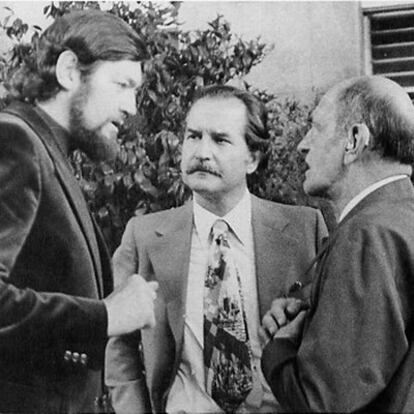Don Luis Buñuel: the godfather of Latin America's literary boom
Gabriel García Márquez, Carlos Fuentes and Mario Vargas Llosa all worshipped director
In the same measure that they used writers such as William Faulkner, James Joyce, Jorge Luis Borges, Marcel Proust and Thomas Mann, the authors of the Latin American literary boom had another reference that they were even more unanimous about: the cinema of Luis Buñuel, or Don Luis as they all called him.
They worshipped his films unwaveringly, as the letters of devotion sent to him by Julio Cortázar, José Donoso, Álvaro Mutis and Gabriel García Márquez attest and as Carlos Fuentes reveals in his book Diana o la cazadora solitaria.
Buñuel expert Javier Herrera has studied the bridge connecting these two unique Spanish cultural strands, and has unearthed some other interesting trails relating to Don Luis along the way, such as the fact that he wanted to adapt Pedro Páramo, Juan Rulfo's masterpiece of magical realism. The proof is the heavily annotated copy of the screenplay that Buñuel kept in his library.
"We admired his freedom, his rebelliousness. In whatever he directed, you found him"
But what did the Viridiana director have that produced such wholehearted admiration across this whole generation? "It wasn't so much that he paid attention to us, as we paid attention to him," says Carlos Fuentes. "For García Márquez, as much as for me, what it was about deep down was that we admired his freedom, his rebelliousness. In whatever he directed, you found him."
Mario Vargas Llosa, who met Buñuel in Paris and not in Mexico, as he did the others, agrees: "We recognize Buñuel in all his work and that, more so in a medium such as cinema, is a rarity."
And there was also his legend: the privilege of being able to meet someone who had not only experienced, but also formed an active part of the Paris avant-garde. "For us Buñuel was the living truth, the direct experience of that time," says Colombian writer Álvaro Mutis. But the interest seemed mutual in some cases, as frustrating as they were. An attempt to shoot a film written by García Márquez - Es tan fácil que hasta los hombres pueden - fell through and neither did a project to film a Cortázar short story come together.
Chilean writer José Donoso went delirious over the genuine interest Buñuel showed in filming his Hell Has No Limits, writing to him in jest: "I have to communicate to you that today they are bringing me six tons of firewood. They are to make the bonfire on which I will burn your photograph if you don't make this film for me: I will send you the ashes. I will also send you the bill of my psychiatrist, that of my wife and of [my daughter] Pilarcita."
Donoso ultimately should have passed the psychiatrists' bills to the regime. Francoism wasn't yet prepared to see both artists' signatures on a Spanish film and the censors banned the project.

Tu suscripción se está usando en otro dispositivo
¿Quieres añadir otro usuario a tu suscripción?
Si continúas leyendo en este dispositivo, no se podrá leer en el otro.
FlechaTu suscripción se está usando en otro dispositivo y solo puedes acceder a EL PAÍS desde un dispositivo a la vez.
Si quieres compartir tu cuenta, cambia tu suscripción a la modalidad Premium, así podrás añadir otro usuario. Cada uno accederá con su propia cuenta de email, lo que os permitirá personalizar vuestra experiencia en EL PAÍS.
¿Tienes una suscripción de empresa? Accede aquí para contratar más cuentas.
En el caso de no saber quién está usando tu cuenta, te recomendamos cambiar tu contraseña aquí.
Si decides continuar compartiendo tu cuenta, este mensaje se mostrará en tu dispositivo y en el de la otra persona que está usando tu cuenta de forma indefinida, afectando a tu experiencia de lectura. Puedes consultar aquí los términos y condiciones de la suscripción digital.








































